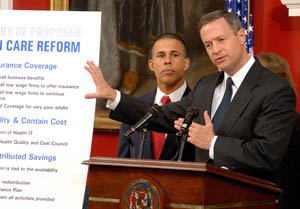 |
|||||
| Politics | Business | Schools | Justice | Health | Et Cetera |
By Andy Zieminski The proposal comes as lawmakers prepare to take up O'Malley's plan to close a $1.7 billion budget deficit by raising the sales tax and tobacco tax, lowering the property tax and changing the income tax, among other revenue proposals. "All of these things go together," O'Malley said of the health and budget proposals. "The debates we've been having on the fiscal level are really at their core about making sure that our state can return to the path of progress." Some wondered why the governor wants to increase spending at a time when legislators are returning to Annapolis to solve the state's financial woes. "I thought we were going back to special session to fix the deficit, not make it worse," said Sen. E.J. Pipkin, R-Queen Anne's. "I think somebody has to get the message to the governor to stop digging the deficit hole deeper." Reforming health care is a complex issue that requires more time than a special session allows, Pipkin said. "This is not special session material." But O'Malley said that controlling spiraling health costs through expanded health insurance can help eradicate the deficit, because 25 percent of the state budget goes to health care costs. He said his plan is a first step toward the long-term goal of attaining universal coverage for Maryland's estimated 800,000 uninsured residents. It is cheaper for the state, hospitals and insured Marylanders when the uninsured get preventive health care rather than waiting until they develop serious ailments, he said. O'Malley's plan would offer up to $30 million in subsidies to help small business owners get or keep health plans for their workers. It would also raise income limits for Medicaid eligibility to include parents who earn up to 116 percent of the federal poverty level. State officials said current rules limit Medicaid eligibility to parents making about 35 percent of the federal poverty level or less. The plan would expand coverage in future years to include adults without children making up to 116 percent of the poverty level. Adults without children are currently ineligible for state Medicaid, officials said. In its first year, the governor's plan would draw $85 million from the general fund, $75 million from a surplus in the Maryland Health Insurance Plan and $50 million from matching federal funds. The governor's program is sustainable because any expansion would depend on the availability of funds, said Health Secretary John Colmers. "This proposal expands Medicaid coverage responsibly over several years on a pay-as-you-go basis," he said. O'Malley hopes that in fiscal 2012, the plan will grow to include $250 million from the general fund, as well as other funding sources. The $85 million needed from the general fund in fiscal 2009 would come from the tobacco tax, which O'Malley hopes the General Assembly will double to $2 in the coming weeks, said O'Malley spokesman Rick Abbruzzese. "It gets complicated," Abbruzzese said. "If we're successful in the special session, the tobacco tax will yield in the rest of 2008 about $85 million." Sen. Robert Garagiola, D-Montgomery, praised the plan, calling it "a three-legged health care stool that focuses on improving access, making health care more affordable and improving the quality of health care." The plan's small business component would devote up to $20 million in subsidies to employers and employees who want to buy health insurance and up to $10 million to help small business owners afford programs they are already offering their employees.
|
||||||||
|
Copyright © 2007 University of Maryland Philip Merrill College of Journalism | ||||||||
| Politics | Business | Schools | Justice | Health | Et Cetera | |||
